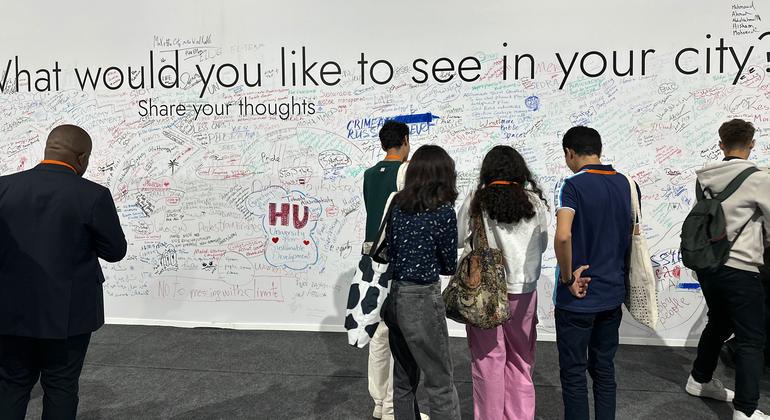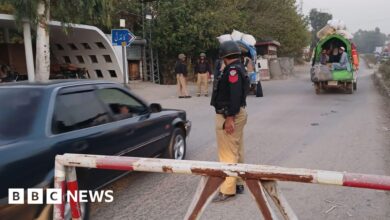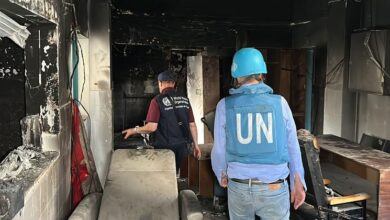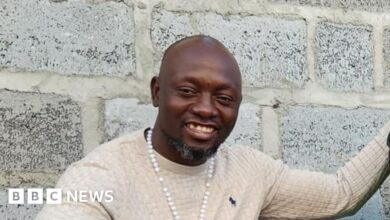‘Tons of ideas!’: World Urban Forum in Cairo hears call for youth-led solutions to urban challenges

“What would you like to see in your city?”
This is a simple question printed on one of the walls inside the Egyptian International Exhibition Center, where the 12th session of the Forum, called WUF12is underway.
Many young delegates enthusiastically scribbled down their answers, some even exclaimed “we have so many ideas!”
Anacláudia Rossbach, Executive Director of the United Nations Human Settlements Program (UN-Habitat), the Forum’s convening body, stood in the conference room just behind this wall and emphasized with equal enthusiasm the need for immediate action to build homes “for those born into this world.” this world. We don’t want the slums to become the birthplace of a new generation.”
That call came as she addressed one of WUF12’s central conversations: Housing for Our Future, in which participants considered the meaning of affordable housing, the barriers to Access barriers and solutions have successfully overcome this problem.
“We need to make sure we plan our cities for the future” and understand how young people live today…and how [they] will live in the future.” Ms. Rossbach emphasized.
Youth-led urban development
In the late afternoon, children and young people came together for a round table conversation about what they would like to see in the cities of the future. By actively empowering young people to impact the cities and communities of the future, they aim to question and change the status quo.

One of the main participants is Lujain Romouzy, a 19-year-old dental student and Vice President of the Leaf Alliance. She is a junior negotiator representing Egypt in the United Nations climate talks on ‘loss and damage‘ – refers to the adverse consequences of climate change suffered by developing countries and efforts to compensate those countries.
She said UN News that she was attending WUF12 “to advocate for sustainable innovations and their importance in urban planning and sustainable development.”
“I hope everyone can agree on the importance of youth-led initiatives in urban development,” she said, adding: “Young people have a lot of creative and innovative ideas. can help reduce emissions while keeping urban developments in mind, such as nature- based on solutions and projects created by youth.”
‘High expectations’
Lujain and other young participants presented a policy statement they had collected from Egyptian authorities.
“We will take this document to the climate policy council and then give it to the negotiating team, including me, to present at the COP29 and ensuring that (youth) voices are heard and included,” Lujain added, referring to the United Nations climate conference set to open next week in Baku, Azerbaijan.

Quynh Anh Le, high school student and youth representative of UN-Habitat Vietnam, also prioritizes creating a platform for young voices. She said UN News that she has “high expectations” for WUF12 because she considers it one of the largest urban development forums in the world.
“I hope to find projects that I can bring back home and that I can copy and apply to my city,” she explains.
Safe urban environment
Meanwhile, Haoliang Xu, Deputy Director of the United Nations Development Program (UNDP), speak UN News that “youth perspectives are extremely important.”
Mr. Xu added: “You really have to look at the ecosystem that creates jobs for young people – from the education system to the ecosystem that encourages innovation – and provides a safe environment for young people to innovate, succeed. business establishment and financial incentives”.
He pointed out that there are many things “you cannot achieve” without the participation of youth, adding that “sustainable management of city urbanization needs to adopt a multi-stakeholder approach relate to”.
He emphasized the important role of the Pact for the Future in such efforts, saying it reaffirms the international community’s commitment to such efforts. Sustainable development goals (SDG).
“If you look at the areas of action in the treaty, they resonate with all the elements in the SDGs, from adequate housing to inclusive urban management, building resilience and tackling poverty. potential disaster.”

Haoliang Xu, Deputy Administrator of UNDP.
‘Housing is a human right’
Balakrishnan Rajagopal, United Nations Special Rapporteur on the right to adequate housing, said UN News That inclusion, including ensuring that women and young people are not discriminated against, is a key element in a human rights-based approach to housing.
“What that means is, first of all, a country should have better data on when they are actually violating the rights of particularly vulnerable groups, such as youth, children,” he explains. or women”. this type of data.
He emphasized that ‘housing for the future’ means “we are finally starting to recognize that housing is a human right”.
“It is not a commodity, nor is it simply state-owned property. But it is what gives meaning and dignity to human life and gives them security. And it also means we are more honest about the challenges we are facing in providing or ensuring access to housing for everyone,” Rajagopal added.
Cites and the climate crisis
The theme that ran through almost every WUF12 event that took place on Tuesday was the impact of climate change on cities, and a dialogue session covered just that.
The key questions participants aimed to address were: How can cities and communities identify and scale successful locally-led actions, innovations and solutions to adapt and reduce mitigate climate change? What measures are needed to ensure that laws, policies and innovations that address climate change in urban areas promote justice, inclusivity and environmental justice at the local level ?
Meanwhile, UN-Habitat debut on Tuesday in Cairo the 2024 version of its flagship Report on cities around the world.
The report warns that with rapidly growing urban populations, especially cities in high-risk areas, are increasingly vulnerable to climate hazards.
By 2040, if emissions are not controlled, more than 2 billion urban residents could face annual temperatures exceeding 29°C.
The report says that without inclusive policies for all people – especially those often excluded from the benefits that urban areas can bring – cities will continue to face challenges. face the potentially catastrophic impacts of climate change.
The forum will continue until Friday, November 8. UN News is in Cairo to cover all the action.




